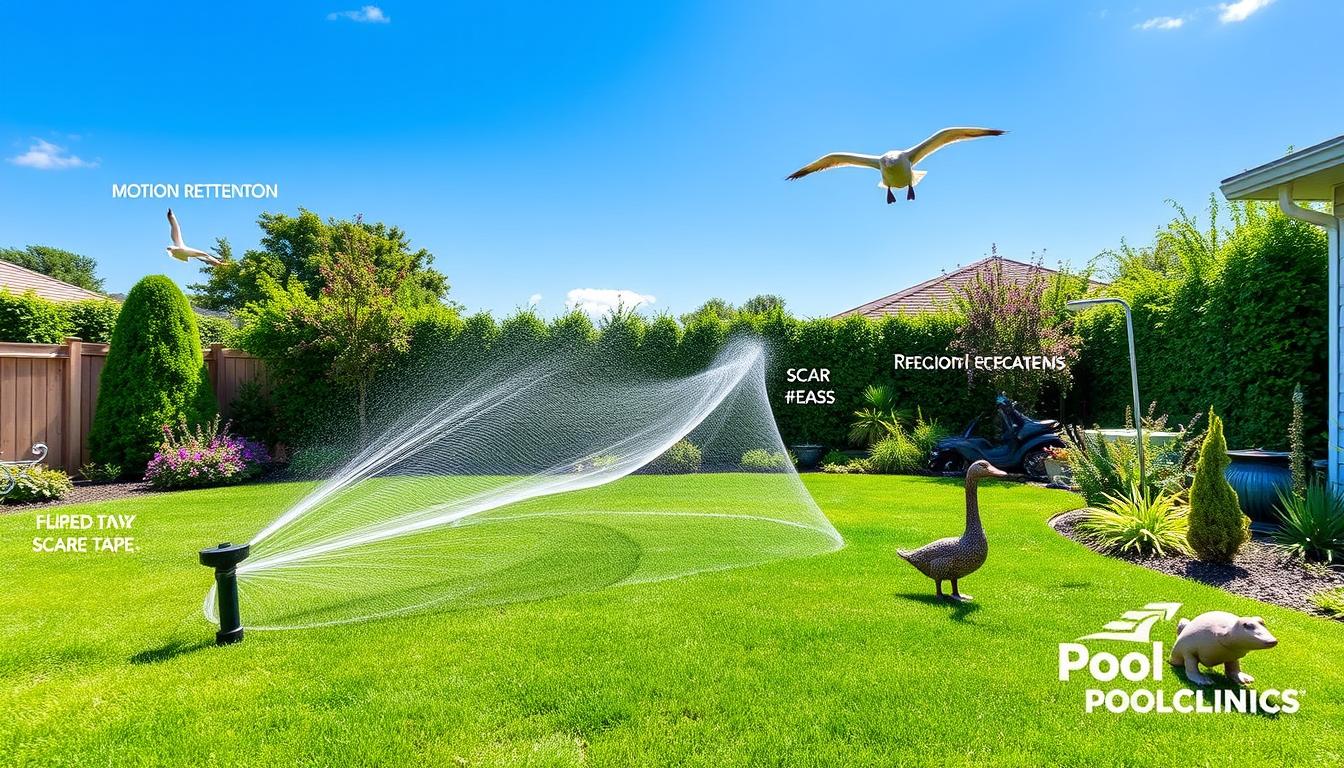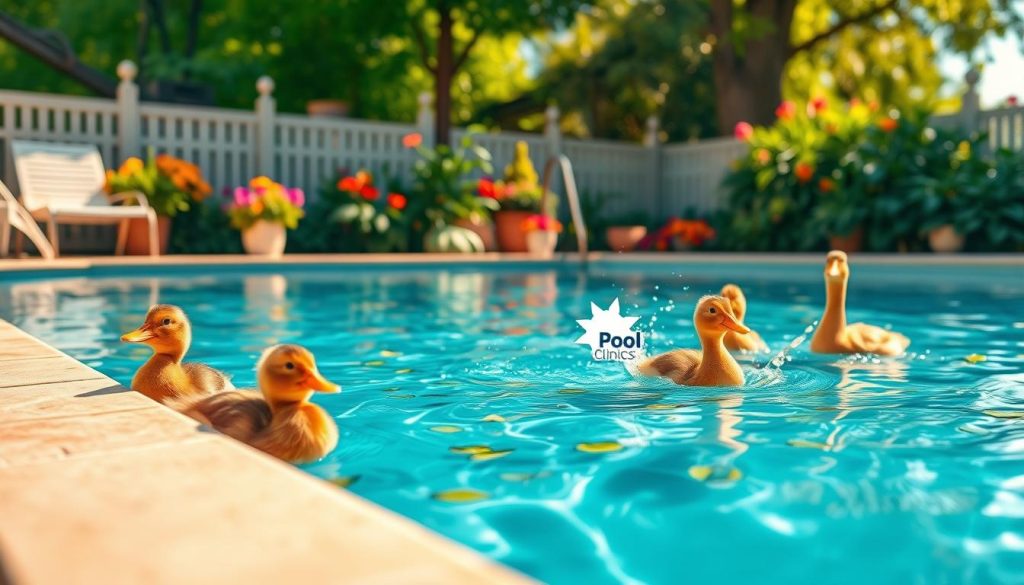
Backyard pools offer a peaceful oasis. But ducks can turn this paradise into a nightmare. They leave droppings, introduce bacteria, and disrupt pool water balance.
Don’t worry if you’re dealing with unwanted duck visitors. We’ve created a guide to help you. It shows how to remove ducks humanely and keep your pool clean.
Effective duck control is vital for a healthy swimming environment. There are many ways to duck-proof your property. Our guide covers humane removal and prevention techniques.
We’ll show you how to use repellents and exclusion strategies. These methods will help keep your pool area duck-free for good.
Key Takeaways
- Understand why ducks are attracted to backyard pools and how their presence can negatively impact water quality and swimmer health.
- Explore effective duck deterrents, such as visual and auditory repellents, to discourage ducks from visiting your pool area.
- Learn about humane duck removal techniques and exclusion strategies to prevent ducks from accessing your pool.
- Discover the importance of consistent pool maintenance and landscaping modifications to create an environment less appealing to ducks.
- Gain insights on collaborating with wildlife professionals for expert advice and assistance in managing persistent duck populations.
Understanding Duck Behavior and Attraction to Pools
Ducks find pools appealing for various reasons. They see pools as ideal spots for bathing, drinking, and sometimes foraging. The calm water and safety of pool edges make them attractive to ducks.
Learning about duck habits helps us create better ways to keep them away. We can develop strategies that discourage ducks without harming them. This approach allows us to maintain our pools while respecting wildlife.

Why Ducks are Drawn to Pools
Pools offer ducks a perfect place to rest and clean their feathers. The still water surface mimics their natural habitat. Surrounding decks provide safety, making pools even more inviting to these birds.
Identifying Duck Species and Their Habits
Different duck species have unique habits and preferences for pools. Knowing about common duck types in residential areas can help us deter them effectively.
- Mallards: Known for their adaptability, mallards are often the most frequently encountered ducks in urban settings. They have a strong affinity for calm water and are drawn to the safety and resources provided by pools.
- Wood Ducks: These colorful ducks prefer wooded areas near water sources. While less common in residential areas, they may occasionally venture into backyard pools, especially if there are nearby trees or shrubs for cover.
- Muscovy Ducks: Originating from Central and South America, Muscovy ducks have become naturalized in many parts of the United States. They are larger than most other duck species and can be more persistent in their presence around pools.
Understanding local duck species helps us create better deterrent strategies. The table below shows key traits of common duck types:
| Duck Species | Preferred Habitat | Feeding Habits | Nesting Habits |
|---|---|---|---|
| Mallards | Varied, adaptable to urban areas | Omnivorous, forages on land and in water | Nests near water, often in vegetation |
| Wood Ducks | Wooded areas near water | Forages on aquatic plants and insects | Nests in tree cavities or nest boxes |
| Muscovy Ducks | Near water sources, adapts to urban areas | Omnivorous, forages on land and in water | Nests on the ground or in low vegetation |
Knowing duck behavior and pool attraction is key to keeping them away. This knowledge helps us create targeted solutions for duck-free pools. We can maintain our backyard oases while respecting these fascinating creatures.
Preventive Measures to Keep Ducks Away
Ducks can turn your pool into their personal playground. To prevent this, use a mix of strategies. These steps make your pool area less appealing to feathered visitors.
By being proactive, you can reduce unwanted duck encounters. This helps maintain a clean, safe swimming environment for you and your family.
Covering the Pool
Install a sturdy, well-fitted pool cover to deter ducks. Covers act as physical barriers, stopping ducks from landing on the water. Choose materials that can withstand the weight of ducks and other wildlife.
A good cover ensures that ducks cannot easily penetrate or damage it. This simple step can greatly reduce duck visits.
Installing Visual Deterrents
Ducks rely on vision to assess landing spots. Place visual deterrents around your pool to disrupt their sense of security. This can discourage them from settling in your pool area.
Some effective visual deterrents include:
- Scarecrows or decoy predators, such as plastic owls or hawks
- Reflective pinwheels or streamers that move in the wind
- Floating objects like beach balls or pool noodles
Erecting Fencing or Barriers
Create a physical barrier around your pool to prevent duck access. Install fencing that’s at least 4-6 feet high. Make sure it’s securely anchored with no gaps.
You can also use pool barriers or nets. These cover the entire water surface, making it impossible for ducks to land.
| Fencing Type | Height (feet) | Effectiveness |
|---|---|---|
| Temporary Mesh Fencing | 4-6 | Moderate |
| Permanent Metal Fencing | 6+ | High |
| Pool Barriers/Nets | N/A | High |
Trimming Landscaping
Ducks like areas with shelter, privacy, and easy water access. Trim overhanging branches, dense vegetation, and tall grasses near your pool. This makes the area less appealing to ducks.
Keep the pool area open and exposed. This reduces hiding spots and makes it easier to spot unwanted visitors.
Remember, consistency is key when implementing duck prevention strategies. Regularly maintain your pool covers, visual deterrents, fencing, and landscaping to ensure their effectiveness in keeping ducks away from your pool.
How to Get Rid of Ducks: Effective Techniques
Ducks can be a nuisance in swimming pools. Luckily, there are ways to discourage them from settling in. Let’s explore some simple changes and tools to make your pool less inviting to ducks.
Water Movement and Modifications
Moving water is a great duck deterrent. Install a pool fountain or water sprayer to create an unsettling surface. Motion-activated water jets can also startle ducks and keep them away.
Floating devices with reflective surfaces can make ducks think twice about landing. Motion-activated sprinklers are another effective tool to scare off these feathered visitors.
Using Duck Repellents
Repellents are another useful tool for duck management. Commercial or homemade solutions like citrus sprays can create unpleasant odors for ducks. Always follow the instructions when using repellents and reapply as needed.
Collaborating with Wildlife Professionals
If duck problems persist, consider seeking help from wildlife experts. They can provide guidance on humane duck control and relocation. These professionals offer strategies tailored to your specific situation.
Remember to ensure all methods comply with local laws. Many duck species are protected under wildlife conservation regulations. Always prioritize the safety and well-being of these animals.







